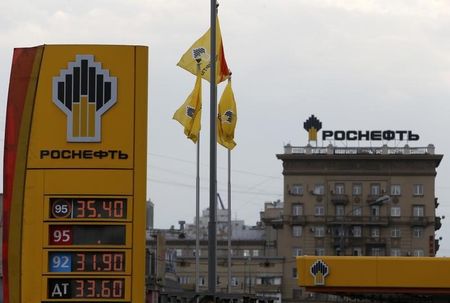By Dmitry Zhdannikov
LONDON (Reuters) - Rosneft, Russia's biggest crude oil producer, may back out of a deal to buy Morgan Stanley's oil trading unit because Western sanctions make it virtually impossible to finance day-to-day operations, three sources close to the state-controlled company said.
The people said the chances of the deal going through range from "possible" to "highly unlikely."
The business in question trades actual barrels of oil instead of just contracts linked to the price of crude. Morgan Stanley is under U.S. pressure to sell the unit because regulators regard physical oil trading as too risky for a major bank to own because unpredictable events like oil tanker leaks could expose it to billions of dollars in liability.
A spokesman for Morgan Stanley declined to comment. Ruth Porat, the bank's chief financial officer, said in July she expected the deal to close later this year. Rosneft declined official comment.
Rosneft agreed to buy the unit in December. Since then, the United States and the European Union have slapped wide-ranging sanctions on Russia's energy and military sectors to punish Moscow for its incursion into Ukraine. Rosneft's chief Igor Sechin, a close ally of Russian President Vladimir Putin, has been on the U.S. sanctions list since April. Rosneft itself was added to the list in July.
Rosneft has enough cash to buy the Morgan Stanley unit, which sources said carries a price tag of between $300 million (185 million pounds) to $400 million. But to operate day-to-day, the business requires billions of dollars of bank lines of credit, funding that's difficult to secure given the sanctions.
Reuters couldn't learn the precise size of these credit lines, but trading houses that compete with Morgan Stanley such as Vitol, Mercuria and Trafigura each have $30 billion to $40 billion worth of credit lines with dozens of banks.
"This deal just cannot go through. It is not an issue of finding $300 million to buy the business. Rosneft has the money. But it won't be able to operate it," one Russian-based source with direct knowledge of the matter said.
One remaining obstacle for the deal is approval from the Committee on Foreign Investment in the United States, a regulatory group that vets mergers and acquisitions that may affect U.S. security. CFIUS has asked Rosneft and Morgan Stanley for more information about the deal, without approving it or rejecting it, a step that lawyers said is not unusual for a transaction under review.
One Rosneft source said talks with CFIUS were still continuing: "The U.S. bureaucracy has simply asked for more information. We are still in the game."
Others are less sure. A Western banking source who works with Rosneft said the company believes it could not do much with assets of a U.S.-regulated bank - even if it was allowed to buy them - because of sanctions.
BORROWING FROM CHINA
In August, Rosneft applied for a $42 billion loan from a state wealth fund to help it weather sanctions. Last week, a Russian deputy prime minister said the government is considering the applications.
For now, Rosneft, which generates $30 billion in cash flow a year, is meeting its financing needs from internal resources. It can also borrow from China, which has made available billions of dollars of credit lines to Russia.
Morgan Stanley has been trying to sell its oil trading division for almost two years. Previous attempts to sell to buyers in the Middle East and Asia failed due to price and operational differences, according to market sources.
The failure to sell the unit may benefit the bank because revenue in commodity trading businesses has been rising this year as markets have gyrated.
Sources told Reuters in July that after more than a year of scaling back, Morgan Stanley has started expanding its commodity division again with plans to hire traders, sales staff and other professionals in the United States.

(Reporting by Dmitry Zhdannikov in London, additional reporting by Lauren LaCapra in New York, editing by Dan Wilchins and John Pickering)
2_800x533_L_1412520354.jpg)